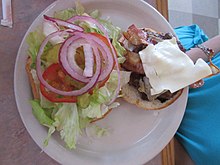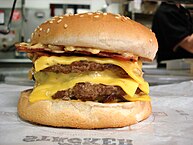Cheeseburger
 Cheeseburger with lettuce and a slice of American cheese | |
| Course | Main course |
|---|---|
| Place of origin | United States |
| Serving temperature | Hot |
| Main ingredients | Ground beef patty, cheese, bun |
A cheeseburger is a hamburger with a slice of melted cheese on top of the meat patty, added near the end of the cooking time. Cheeseburgers can include variations in structure, ingredients and composition. As with other hamburgers, a cheeseburger may include various condiments and other toppings such as lettuce, tomato, onion, pickles, bacon, avocado, mushrooms, mayonnaise, ketchup, and mustard.
In fast food restaurants across the United States, processed cheese is usually used, although other meltable cheeses are used, such as cheddar, Swiss, mozzarella, blue cheese, or pepper jack. Virtually all restaurants that sell hamburgers also offer cheeseburgers.
Origins
By the late 19th century, the vast grasslands of the Great Plains had been opened up for cattle ranching. This made it possible for many Americans to consume beef almost daily. The hamburger remains as one of the cheapest forms of beef in America.[1]
Adding cheese to hamburgers became popular in the 1920s. There are several competing claims as to who created the first cheeseburger. Lionel Sternberger is reputed to have introduced the cheeseburger in 1924 at the age of 16. He was working as a fry cook at his father's Pasadena, California, sandwich shop, "The Rite Spot", and "experimentally dropped a slab of American cheese on a sizzling hamburger."[2][3][4][5][6][7] An early example of the cheeseburger appearing on a menu is a 1928 menu for the Los Angeles restaurant O'Dell's, which listed a cheeseburger smothered with chili for 25 cents.[8][9][10]
Other restaurants also claim to have invented the cheeseburger. For example, Kaelin's Restaurant in Louisville, Kentucky, said it invented the cheeseburger in 1934.[11] One year later, a trademark for the name "cheeseburger" was awarded to Louis Ballast of the Humpty Dumpty Drive-In in Denver, Colorado.[12] According to Steak 'n Shake archives, the restaurant's founder, Gus Belt, applied for a trademark on the word in the 1930s.[13][14][15]
Dale Mulder, the owner of an A&W Restaurants franchise in Lansing, Michigan, has been credited with inventing the bacon cheeseburger in 1963, putting it on the menu after repeated requests from the same customer.[16] This was highlighted in a 2014 ad campaign for the chain featuring Mulder, who had since become the president of the A&W chain.[17] However, there are earlier examples of a restaurant selling bacon cheeseburgers, including a menu for a Harrisburg, Pennsylvania restaurant from 1941.[18]
The steamed cheeseburger, a variation almost exclusively served in central Connecticut, is believed to have been invented at a restaurant called Jack's Lunch in Middletown, Connecticut, in the 1930s.[19]
The largest cheeseburger ever made weighed 2,014 pounds (914 kg). It is said to have included "60 pounds (27 kg) of bacon, 50 pounds (23 kg) of lettuce, 50 pounds (23 kg) of sliced onions, 40 pounds (18 kg) of pickles, and 40 pounds (18 kg) of cheese." This record was set in 2012 by Minnesota's Black Bear Casino, smashing the previous record of 881 pounds (400 kg).[20]
In the United States, National Cheeseburger Day is celebrated annually on September 18.[21]
Ingredients

The ingredients used to create cheeseburgers follow similar patterns found in the regional variations of hamburgers, although most start with ground beef. Common cheeses used for topping are American, Swiss, Cheddar and other meltable cheeses. Popular toppings include lettuce, tomato, onion, pickles, bacon, avocado or guacamole, sliced sautéed mushrooms, cheese sauce or chili, but the variety of possible toppings is broad.
A cheeseburger may have more than one patty or more than one slice of cheese—it is reasonably common, but by no means automatic, for the number to increase at the same rate with cheese and meat interleaved. A stack of two or more patties follows the same basic pattern as hamburgers: with two patties will be called a double cheeseburger; a triple cheeseburger has three, and while much less common, a quadruple has four.[22][23]
Sometimes cheeseburgers are prepared with the cheese enclosed within the ground beef, rather than on top. This is sometimes known as a Jucy Lucy.[24]
Gallery
-
A Burger King "Quad Stacker" cheeseburger, containing four patties and bacon
-
A cheeseburger at a restaurant in Camden Town, London
-
A half-eaten McDonald's Big Mac, showing the contents of the burger
See also
References
- ^ Ozersky, Josh (2008). The Hamburger: The History. New Haven Conn.: Yale University Press. pp. 12, 14. ISBN 9780300117585.
- ^ "Plaque commemorating invention of the cheeseburger in Pasadena dedicated at LA Financial Credit Union". Pasadena Chamber of Commerce.
- ^ Piasecki, Joe (January 16, 2012). "Pasadena claims its slice of burger history". Los Angeles Times. ISSN 0458-3035. Retrieved October 15, 2017.
- ^ Harvey, Steve (March 27, 1991). "Only in L.A." Los Angeles Times. p. B2.
Cooking at his father's short-order joint in Pasadena in the early 1920s, [Sternberger] experimentally tossed a slice (variety unknown) on a hamburger...
- ^ Perry, Charles (June 9, 2004). "It's an L.A. Thing; Our burgers are the best with good reason: We made them here first". Los Angeles Times. p. F1. Archived from the original on October 25, 2012. Retrieved May 13, 2012.
- ^ Piasecki, Joe (January 13, 2012). "Yes, it was invented in Pasadena! Probably. Tracing the cheeseburger from inception to Bob's Big Boy". Pasadena Sun. Archived from the original on January 29, 2012. Retrieved May 13, 2012.
- ^ Henerson, Evan (June 23, 1999). "The Tale of the Cheeseburger". San Gabriel Valley Tribune. Archived from the original on April 12, 2003. Retrieved May 13, 2012.
- ^ Grace, Roger M. (January 15, 2004). "Old Menus Tell the History of Hamburgers in L.A." Metropolitan News-Enterprise. Retrieved May 13, 2012.
- ^ Spiers, Katherine (September 18, 2013). "Were Cheeseburgers Invented in Pasadena?". KCET. Retrieved December 8, 2014.
- ^ "O'Dell's menu". Menu Collection. Los Angeles Public Library. 1928. Archived from the original on October 28, 2017. Retrieved October 28, 2017.
- ^ "Louisville Facts & Firsts - LouisvilleKy.gov". City of Louisville, Kentucky. Archived from the original on October 6, 2014. Retrieved July 29, 2006.
- ^ "History of the Cheeseburger". Cheese-Burger.net (blog). Archived from the original on August 2, 2018. Retrieved October 2, 2008.
- ^ Flick, Bill (February 20, 2012). "Flick Fact 2/20/2012 Monday". Bloomington Pantagraph. Archived from the original on September 11, 2012. Retrieved February 21, 2012.
- ^ "Our 'Top 5 List' of little-known facts about Bloomington-Normal". WJBC-FM. July 29, 2011. Archived from the original on December 2, 2011. Retrieved February 21, 2012.
- ^ Perry, Catherine D. (July 7, 2004). "Steak 'n Shake vs Burger King, Memorandum and Order" (PDF). United States District Court Eastern District Missouri Eastern Division. Archived from the original (PDF) on September 28, 2013. Retrieved February 21, 2012. (7 July 2004) 323 F. Supp.2d 983 (E.D. Mo. 2004)
- ^ Jason, Jason (June 22, 2015). "14 Things You Didn't Know About A&W Restaurants". Thrillist. Retrieved September 9, 2016.
- ^ "You'll Never Guess Who Invented the Bacon Cheeseburger", Ad Age, June 23, 2014, Web.
- ^ "NEW—DIFFERENT; Announcing Opening of Hitchin' Post Restaurant", Harrisburg Evening News, January 3, 1941, page eight. Retrieved November 16, 2024 via Newspapers.com.
- ^ George Motz (May 10, 2011). Hamburger America: Completely Revised and Updated Edition: A State-by-State Guide to 150 Great Burger Joints. Running Press. p. 70. ISBN 978-0-7624-4234-8.
- ^ Ulla, Gabe (September 4, 2012). "World's Biggest Cheeseburger Clocks in at 2,014 Pounds". Eater. Retrieved March 2, 2017.
- ^ Tyko, Kelly (September 18, 2018). "Free cheeseburgers! Where to find the meal deals for National Cheeseburger Day Tuesday". USA Today. Retrieved February 25, 2019.
- ^ Tice, Carol (January 28, 2002). "In-N-Out Burgers: With an emphasis on quality, this fast feeder shows its rare appeal. (Regional Powerhouse Chains)". Nation's Restaurant News. Archived from the original on December 7, 2014.
- ^ Hall, David (October 24, 2006). "Society's fast food intake reeks". Daily Skiff. Texas Christian University School of Journalism. Retrieved February 13, 2010.
- ^ Flower, Justin; Boller, Jay (March 13, 2008). "Burger Battle". Minnesota Daily. Archived from the original on July 10, 2009. Retrieved October 31, 2017.
Further reading
- Henerson, Evan (June 23, 1999). "The Tale of the Cheeseburger". San Gabriel Valley Tribune. Archived from the original on April 12, 2003.
- Nosowitz, Dan (July 6, 2018). "The Price of Cheeseburgers Has Gone Up". Modern Farmer. Retrieved February 25, 2019.
- Gilad, Elon (August 16, 2018). "Can Jews eat cheeseburgers after all?". Haaretz. Retrieved February 25, 2019.




